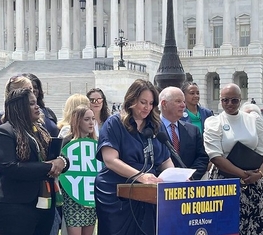Building a Speakers Bureau: Best Practices and Materials
Speakers bureaus are a great way to raise public awareness about issues, recruit members/volunteers, establish press/media contacts, fundraise, and create visibility for the League
Dear League Leaders,
LWVUS is proud to share our guide on How to Build Effective Speakers Bureaus for Redistricting. In 2019, LWV launched the People Powered Fair Maps (PPFM) in response to the U.S. Supreme Court’s Decision in the Rucho vs. Common Cause case. While the case decided that partisan gerrymandering went beyond the reach of the courts, the League decided to invest in creating meaningful change in the redistricting process by launching this campaign. The People Powered Fair MapsTM, is a multi-state campaign dedicated to fighting for fair maps across the country through legislative change, better transparency and criteria, citizen led ballot initiatives, and organizing through civic engagement. The goal of PPFM is to create maps across the country that reflect their communities and to curb partisan and racial gerrymandering.
Across the country, our League leaders are organizing their communities and becoming experts on redistricting. As we wrap up the Census and prepare for the 2021 legislative sessions and map drawing processes, it will be important to build relationships with community organizations, develop ways to educate people around redistricting related topics, and elevate PPFM as a national campaign. A tool that can help you achieve these goals, is an established speakers bureau on Redistricting. Speakers bureaus are a great way to raise public awareness about issues, recruiting new members and volunteers, establishing press and media contacts, fundraising, and creating visibility in your organization.
This packet will provide you with the framework to create your own speakers bureau on Redistricting or incorporate redistricting related content into your already existing speakers bureau. This document contains best practices, public speaking tips, redistricting topic ideas, and a how to on delivering a Redistricting 101 Presentation.
How to use this packet:
- Incorporate redistricting topics into your pre-existing speakers bureaus
- Use public speaking best practices to train your League speakers
- Follow the Table of Contents in order if you’re starting off! We have intentionally organized the materials in this order so that first time Speakers Bureau creators can seamlessly follow along
- Customization is key. You can tailor and change information and tips given in this packet to your own goals or state and local specifications. The sky is the limit! Be creative.
Speakers bureau next steps:
- Talk to your State/Local President about the idea of a speakers bureau. Work with the leadership in your state or local League to create a plan to create a redistricting speakers bureau.
- Identify your key topics and messaging. Everyone’s situation will be different. Maybe you have an independent commission and want to talk about how commissioners are chosen to serve on the commission, how to monitor it, or how to make mapping suggestions. Perhaps, there is some important redistricting legislation this year for which the League will be advocating. Or, you live in an area where people need to be better organized and aware about redistricting and gerrymandering. Knowing your messaging goals and your audience will help you recruit the right people and reach the right individuals.
- Recruit and advertise! Use our tips on recruiting to tap into the talent in your League on redistricting. This can also be an opportunity to bring in new members.
- Build a training schedule: It’s now time to build the content and expertise. Create a training schedule that works for you to ensure the speakers are comfortable and knowledgeable about the material.
- Promote your speakers bureau to your target audience: A speakers bureau is all about the presentations. With a staffed and trained team, it's time to get them out there—either virtually or in person when it is safe. It’s important to do outreach to organizations and community leaders to offer them the opportunity to book a presentation. Start to brainstorm who you want to engage with and then use the templates provided to make that contact!
- Book! Book! Book!: When scheduling presentations it is important to stay organized. It is helpful to have a centralized document, or calendar, tracking all your presentation requests and who is the lead.
This packet is designed to be your one-stop-shop for all things speakers bureau. It can help you build a program from the ground up or aid in expanding preexisting bureaus. We wanted to make a special note and thank the Arizona, DC, Michigan, Kentucky, and California Leagues who were consulted when formulating this packet. Their collective expertise helped to inform and guide us in creating this packet. It is our hope that all states can learn from these resources to launch their own successful speakers bureau. We here at LWVUS are always on hand to provide that extra level of support in this process, do not hesitate to reach out to Priya Pandey ([email protected]) or Dylan Vargas ([email protected]) for help. Let’s build these speakers bureaus together!
Thank You,
Priya Pandey
Legislative and Policy Coordinator
Dylan Vargas
Legislative and Policy Coordinator
Related Materials
Related Content
This page is your one-stop-shop for tools and resources--including templates, messaging guidance, and background materials--related to the League's work on redistricting.




